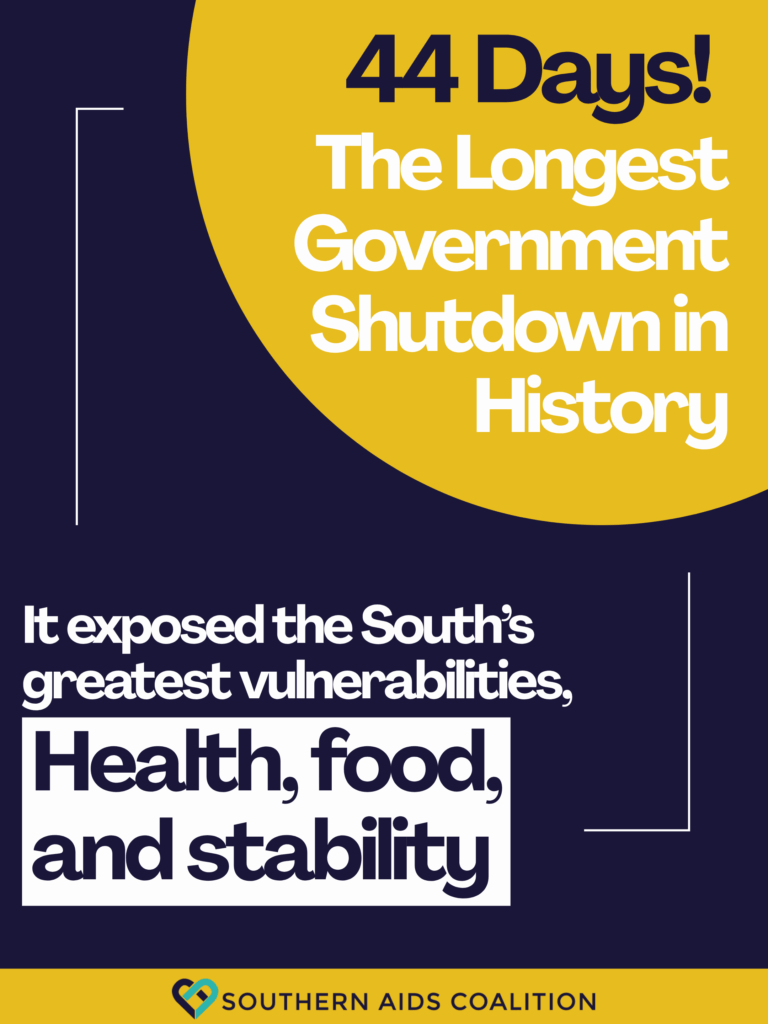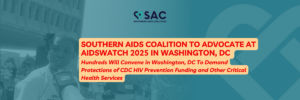Southern AIDS Coalition Responds to the Longest Government Shutdown in History: Protect Health, Food, and Stability in the South, now!
In recent days, the Senate took a critical step toward ending the longest government shutdown in history by advancing a funding measure. It does so without an assurance that the ACA premium subsidies will be extended—leaving millions of people and Southern safety-net systems still exposed. Those most affected include low-income families, mothers and infants, people living with HIV or other chronic illnesses, rural residents, unpaid federal workers and contractors, and communities that have been historically underserved and people facing systemic barriers.
During the shutdown, communities across the South endured delayed or partial SNAP benefits, warnings that WIC could lapse without stop-gap funding, disruptions to clinics and care, and a growing employment shock in states with large federal workforces such as Virginia. In Mississippi, where hospital closures and under-resourced clinics have already narrowed access to care, the shutdown intensified system fragility, pushing essential services even further out of reach for low-income and rural residents. Compounding these harms, the federal data blackout limited visibility for businesses, state agencies, and health systems precisely when timely information was needed most.
While national data show widespread strain, available indicators suggest that the South, due to its heavier reliance on safety-net programs and higher uninsured/hospital-fragility rates, can be expected to bear particularly severe impacts. The cascading effects laid bare how vulnerable Southern households become when federal funding halts. Delayed food benefits and weeks-long partial benefit issuances underscored the fragility of the safety net, while federal data stoppages and paused reimbursements exposed how deeply state and local systems depend on timely federal flow. The budget impasse forced states and communities into crisis mode, diverting resources from long-term public health work to short-term triage. The reliance on urgent, temporary “band-aids” instead of stable funding mechanisms demonstrated that continuity of care cannot depend on stop-gap measures. Above all, this episode showed that the political model of “shutdown now, fix later” shifts the burden of dysfunction onto the people least able to absorb it—especially in Southern communities already operating with fewer buffers and deeper inequities.
Food assistance remains one of the clearest examples of this harm. States across the South warned of halted or partial November SNAP benefits, with court-ordered funds covering only about half of typical payments in many places, while WIC operated on short-term emergency funding that advocates described as little more than a temporary patch. South Carolina’s Department of Social Services warned that more than 260,000 households could miss benefits, while Texas officials reported potential delays even after partial federal funding was restored.
Health care access and safety-net delivery also suffered. Community Health Centers (CHCs)—the backbone of care in rural and low-income Southern communities—faced growing instability after the Community Health Center Fund expired on September 30. While limited grant drawdowns occurred, uncertainty forced freezes on hiring, planned expansions, and core services in several states. According to KFF Health News, about 1,500 CHCs nationwide could experience immediate cash-flow strain, with the greatest risk in rural and Southern areas.
The employment shock extended far beyond federal paychecks. In Virginia, roughly three-quarters of recent initial unemployment claims were tied to furloughs, rippling through local economies dependent on federal and contract labor. These financial disruptions multiplied across the South, where families already face higher poverty and less access to savings or affordable credit.
Even before the shutdown, the South was already under pressure. Southern states carried higher uninsured rates, faster Medicaid unwinding losses, and fragile rural hospital finances that often led to closures. Analyses this year show that Texas, Mississippi, Georgia, and Oklahoma rank among the states with the highest uninsured rates and dozens of rural hospitals vulnerable to closure. These preexisting conditions magnified every missed benefit, delayed check, and canceled appointment.
Reopening the government was necessary, but the decision to do so without protecting the ACA premium subsidies comes at a steep cost. By delaying negotiations on these subsidies, Congress has extended uncertainty and deepened the harm already experienced during the shutdown. For millions across the South—where more than 60% of all Marketplace enrollees reside—this decision means continued anxiety over soaring premiums, shrinking coverage options, and further strain on already overburdened clinics and hospitals. Without action, enhanced ACA premium tax credits will expire at the end of 2025, leading to average premium spikes of 26–30% and potential coverage losses for millions, including an estimated 340,000 jobs at risk nationwide. A temporary reopening cannot mask the long-term consequences of neglecting affordable health care access and stability.
The moment demands a whole-of-government response paired with robust state and local investment and engagement. Federal agencies must stabilize nutrition and health programs; states and localities must strengthen backstops for food aid, help CHCs keep their doors open, and stand-up navigation support for families losing coverage. This is about continuity of care, keeping food on the table, and preventing avoidable harm in the nation’s most impacted region.
To Congress: Reopening alone is not sufficient. Congress must act swiftly to extend the enhanced ACA premium tax credits and implement mechanisms that prevent future shutdowns.
To state and local legislators: While advocating for federal fixes, institute state-level contingency frameworks for nutrition, health access, and employment safety nets so that funding disruptions do not translate into immediate service cuts.
To advocates and the public: Contact your representatives now. Reopening the government was necessary, but not enough. Demand protection of health-care affordability through ACA subsidies, improvement of health access, and durable funding mechanisms to prevent communities from being forced into crisis again.


